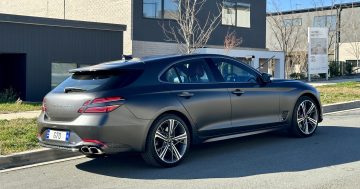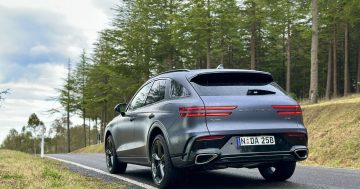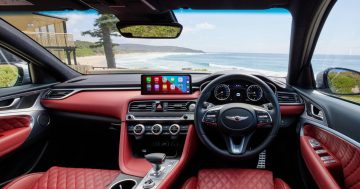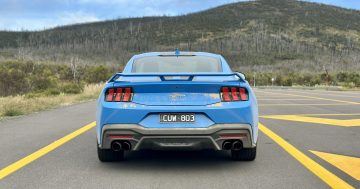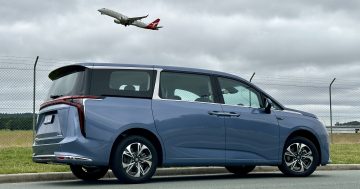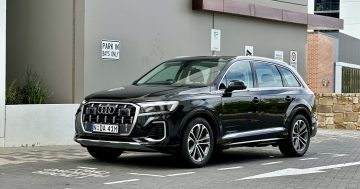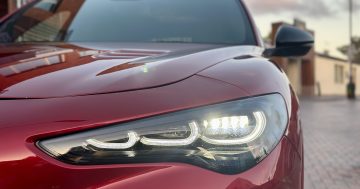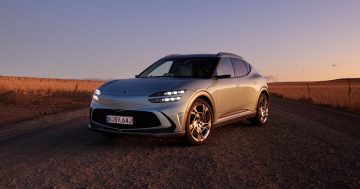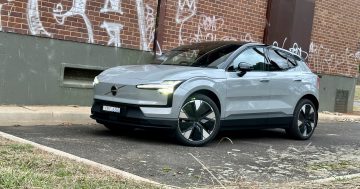By Karl Peskett.
 Taking on an established market is never easy. Just have a look at Purple Bricks. The company promised to turn real estate on its head, undercutting existing agents and agencies and leaving a trail of destruction in its wake. It sunk millions into advertising, but it never took off.
Taking on an established market is never easy. Just have a look at Purple Bricks. The company promised to turn real estate on its head, undercutting existing agents and agencies and leaving a trail of destruction in its wake. It sunk millions into advertising, but it never took off.
Some companies do it successfully, though. Toyota decided that Mercedes-Benz had held enough market share, and so created its own luxury brand to compete. Lexus has gone on to far grander things, and it was this business model that inspired Hyundai to try something similar with its Genesis brand.
Currently it has two vehicles in Australia, the midsize G70 (the subject of this review) and the larger G80. Soon, they will be joined by an SUV, with other models to follow down the track. And after spending a week in the brand’s quickest model, it seems Genesis is going in the right direction.
 The Genesis G70 is a midsize luxury sedan that aims to take on the BMW 3 Series, Lexus IS and Mercedes-Benz C-Class. With two turbocharged engine choices (a 2.0-litre four-cylinder and a 3.3-litre six-cylinder) plus three trim levels, it aims to cover most bases.
The Genesis G70 is a midsize luxury sedan that aims to take on the BMW 3 Series, Lexus IS and Mercedes-Benz C-Class. With two turbocharged engine choices (a 2.0-litre four-cylinder and a 3.3-litre six-cylinder) plus three trim levels, it aims to cover most bases.
Our test vehicle was fitted with the twin-turbo 3.3-litre V6, which is lifted straight from the Kia Stinger, so you’ll be aware that the G70 promises effortless performance. And on that front, it definitely delivers.
Producing a very healthy 272kW and 510Nm, the turbocharged V6 is matched to a slick eight-speed automatic (with steering wheel-mounted paddle shifters). The power then runs to the rear wheels through a limited slip differential, allowing that grunt to be exploited to its maximum potential. You’ll hit 100kmh in 4.7 seconds – definitely not hanging around.
 There are five drive modes (Sport, Normal, Comfort, Eco and Custom), with each affecting the steering weight, the throttle response and the gear shift points. We spent most of the week sitting in Comfort mode, which gave us the most natural steering feel and the most relaxed drive, but still allowed for a burst of acceleration when you flatten the loud pedal.
There are five drive modes (Sport, Normal, Comfort, Eco and Custom), with each affecting the steering weight, the throttle response and the gear shift points. We spent most of the week sitting in Comfort mode, which gave us the most natural steering feel and the most relaxed drive, but still allowed for a burst of acceleration when you flatten the loud pedal.
Despite the steering feeling the most natural in Comfort, it’s still lacking a little feedback, and makes the Genesis not feel as connected as, say, a 3 Series. It also doesn’t have the BMW’s flow when it comes to cornering, preferring to be a point and shoot weapon rather than a corner-carving sports vehicle. But there’s no denying the fact it is devastatingly quick, and a lot cheaper than a similarly specced BMW.
The quality inside is excellent, feeling a cut above the Hyundai range, Santa Fe excepted. The solidity of the build is highlighted by how tight the door seals are, creating a bounce which prevents the doors from shutting on the first pull. It gets a little tiring having to reshut the doors each time. But that is the only negative in the cabin.
 The rest looks and feels exactly like a premium sedan should, with metallic accents, beautiful leather, contrast stitching, seat heaters that work instantly and very comfortable pews. Of course, the back seats could have a little more space, but it’s still better than the Jaguar XE.
The rest looks and feels exactly like a premium sedan should, with metallic accents, beautiful leather, contrast stitching, seat heaters that work instantly and very comfortable pews. Of course, the back seats could have a little more space, but it’s still better than the Jaguar XE.
As standard the Genesis G70 receives LED headlights and tail-lights, power-folding mirrors, electric seats, leather-appointed trim, front seat heating, front and rear parking sensors, an eight-inch touchscreen with sat-nav, digital radio and Bluetooth, plus AEB and radar based cruise control. Inductive phone charging, Apple Car Play and Android Auto, analogue dash instrumentation with a neat “quilted” finish, and dual-zone climate control round out the offering.
Adaptive suspension allows you to take advantage of the different drive modes, and with torque-vectoring, 19-inch Michelin Pilot Cup tyres, and four-piston front Brembo brakes, the G70 is very sure footed indeed.
 Safety-wise, the G70 gets a five-star ANCAP rating, thanks to AEB, blind-zone monitoring, lane-departure warning and pre-collision warning. There’s also rear cross-traffic alert and active lane keeping assist.
Safety-wise, the G70 gets a five-star ANCAP rating, thanks to AEB, blind-zone monitoring, lane-departure warning and pre-collision warning. There’s also rear cross-traffic alert and active lane keeping assist.
As a package, the G70 is a convincing one. It’s priced well, looks amazing and the drive experience is largely positive. Badge snobbery is the key to whether it will succeed or not. We’re hoping that people look past its origins and experience it based on its merits. If they do, they’ll find a well sorted machine that can sit proudly alongside more established players.


